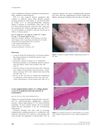 December 2004 in “Medicine”
December 2004 in “Medicine” Pregnancy can cause skin changes and may affect pre-existing skin conditions, with some treatments not safe for use during pregnancy.
 243 citations,
September 2016 in “Dermatology and Therapy”
243 citations,
September 2016 in “Dermatology and Therapy” Dermoscopy is a useful tool for identifying features of skin conditions, but more research is needed to define its role in dermatology.
 July 2005 in “British Journal of Dermatology”
July 2005 in “British Journal of Dermatology” New gene mutations linked to skin conditions were found, bacteria and chemicals may worsen acne, a dog mutation could exist in humans, virus-like elements might be involved in psoriasis, and a vitamin D3 treatment doesn't prevent chemotherapy-related hair loss.
3 citations,
February 2021 in “Pediatric rheumatology online journal” A girl with lupus and trisomy X has a higher risk of bone problems like avascular necrosis and osteoporosis.
 5 citations,
January 2022 in “Journal of Clinical Medicine”
5 citations,
January 2022 in “Journal of Clinical Medicine” Dermoscopy and trichoscopy are useful for diagnosing skin signs in Dermatomyositis.
 December 2024 in “Indian Dermatology Online Journal”
December 2024 in “Indian Dermatology Online Journal” Gemstones are used to help describe and remember skin conditions.
16 citations,
November 2008 in “Journal of the American Academy of Dermatology” Consider necrolytic acral erythema in similar cases and treat with oral zinc sulfate.
82 citations,
May 2010 in “PLoS neglected tropical diseases” Secondary syphilis in Cali, Colombia, shows high Treponema pallidum presence and challenges in early diagnosis, needing better public health strategies.
1 citations,
January 2012 in “Médecine et Maladies Infectieuses” The man's symptoms improved significantly after penicillin treatment for syphilis.
17 citations,
January 2012 in “European Journal of Pharmaceutics and Biopharmaceutics” Isoconazole nitrate stays effective in skin and hair follicles for up to two weeks after use.
 4 citations,
August 2017 in “Journal of Cosmetic Dermatology”
4 citations,
August 2017 in “Journal of Cosmetic Dermatology” Finger length ratio may indicate male hair loss.
 2 citations,
December 2021 in “Journal of Veterinary Medical Science”
2 citations,
December 2021 in “Journal of Veterinary Medical Science” Lokivetmab reduced itching in a dog with skin lymphoma.
 24 citations,
September 2008 in “Clinical and experimental dermatology”
24 citations,
September 2008 in “Clinical and experimental dermatology” Repigmentation in vitiligo may come from melanocyte stem cells in the skin.
 141 citations,
January 1984 in “Journal of The American Academy of Dermatology”
141 citations,
January 1984 in “Journal of The American Academy of Dermatology” Pregnancy can cause skin darkening, varicose veins, more sweating, hair growth, hair loss after birth, nail changes, and gum inflammation.
13 citations,
January 2018 in “Yonsei Medical Journal” A specific gene mutation causes Olmsted syndrome.
 1 citations,
April 2022 in “Rheumatology”
1 citations,
April 2022 in “Rheumatology” A man developed autoimmune symptoms after the Pfizer COVID-19 vaccine, highlighting the need for thorough vaccine safety checks.
82 citations,
March 2013 in “PLoS ONE” Vemurafenib causes skin side effects similar to RASopathies, requiring regular skin checks and UVA protection.
 7 citations,
July 2014 in “BMJ case reports”
7 citations,
July 2014 in “BMJ case reports” A rare skin disorder, Ichthyosis with confetti, has no cure but treatment focuses on managing symptoms with moisturizers.
 1 citations,
January 2014 in “International Journal of Trichology”
1 citations,
January 2014 in “International Journal of Trichology” A patient with a rare hair condition and skin disorder showed hair improvement after treatment.
10 citations,
April 2013 in “Journal of Investigative Dermatology” Epidermolytic ichthyosis can be inherited in a semidominant way with mild symptoms in carriers.
 19 citations,
October 2008 in “Journal der Deutschen Dermatologischen Gesellschaft”
19 citations,
October 2008 in “Journal der Deutschen Dermatologischen Gesellschaft” Anti-cancer treatments can cause reversible hair loss, skin sensitivity, pigmentation changes, nail damage, and skin reactions, with a need for more research on managing these side effects.
 23 citations,
July 2008 in “British journal of dermatology/British journal of dermatology, Supplement”
23 citations,
July 2008 in “British journal of dermatology/British journal of dermatology, Supplement” Topical contact sensitizers can treat certain skin conditions but are rarely used in the U.K.
 February 2021 in “Indonesian Journal of Perinatology”
February 2021 in “Indonesian Journal of Perinatology” Most pregnancies with SLE resulted in intrauterine growth restriction (IUGR).
12 citations,
January 2020 in “Indian Dermatology Online Journal” Female pattern hair loss has multiple causes and treatments, with new therapies showing promise.
 7 citations,
November 2006 in “Pediatric Dermatology”
7 citations,
November 2006 in “Pediatric Dermatology” A newborn with congenital syphilis had unusual hair loss possibly caused by the infection.
 7 citations,
January 1993 in “Rheumatology”
7 citations,
January 1993 in “Rheumatology” Most skin rashes in rheumatoid arthritis patients were not caused by their medication, and careful evaluation allowed most to keep taking their beneficial treatment.
 144 citations,
September 2006 in “Clinics in Dermatology”
144 citations,
September 2006 in “Clinics in Dermatology” Lupus affects the body and skin, causing joint pain and skin issues that can be treated with steroids and antimalarial drugs.
 July 2003 in “Journal of Cutaneous Medicine and Surgery”
July 2003 in “Journal of Cutaneous Medicine and Surgery” Various skin conditions like cutaneous lupus erythematosus, psoriasis, and basal cell carcinoma can be effectively treated with antihypertensive agents, NB-UVB phototherapy, and imiquimod cream respectively. Vaccines are effective against genital herpes and HPV-16 infection. Early intervention is crucial for conditions like diabetic foot ulcers and neonatal herpes. Certain dyes can cause hand dermatitis, and there's a link between smoking/drinking and psoriasis in men. No direct link was found between low iron levels and chronic hair loss in women.
 30 citations,
September 2005 in “Best Practice & Research Clinical Rheumatology”
30 citations,
September 2005 in “Best Practice & Research Clinical Rheumatology” The document concludes that treating tough skin disease in lupus involves sun protection, steroids, antimalarials, and various other therapies chosen based on individual risks and benefits.
 4 citations,
March 2002 in “Journal of the American Pharmaceutical Association”
4 citations,
March 2002 in “Journal of the American Pharmaceutical Association” The conclusion is that pharmacists are important in helping women choose the right skin care treatments.





















